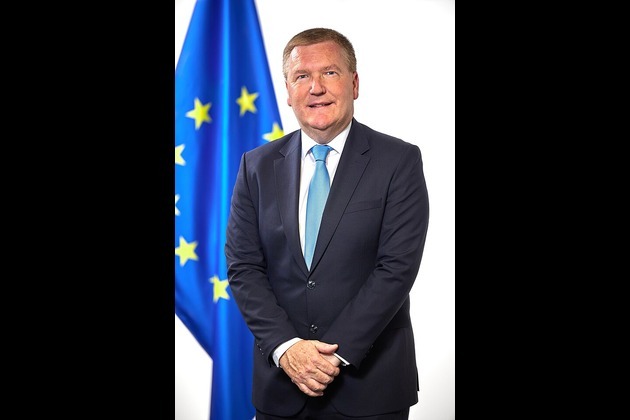Your political views can predict how you pronounce certain words
The Conversation
21 Oct 2019, 17:54 GMT+10

Politics can predict the TV shows we watch, the shops we frequent and the places we live.
But what about the way we speak?
In a recent study, I was able to show how your political orientation can influence how you pronounce certain words.
How members of America's two parties view the country - and its place in the world - might explain this phenomenon.
A tale of two presidents
You may have noticed President Donald Trump has a unique way of saying the names of foreign places.
For example, he's pronounced "Tanzania" as "tan-zay-nee-uh," as opposed to "tan-zuh-nee-uh," and "Namibia" as "nam-bee-uh" instead of "na-mih-bee-uh."
At the other end of the spectrum, President Barack Obama was a "stickler" for saying foreign words in a way that more closely mimicked the pronunciation of native speakers. He was even thanked for it: Pakistanis reportedly expressed appreciation to the White House for his pronunciation of "Pakistan" as "pock-ee-stahn," rather than using a pronunciation like "pack-iss-stan."
My own research has found that this pronunciation difference isn't relegated to presidents. Speakers who identify as Democrats are likelier to use these kinds of pronunciations of foreign words than those who identify as Republicans.
A speech pattern emerges
In my study, I had participants read random sentences out loud, some of which included the names of foreign places, and others that included English words borrowed from foreign languages.
Then I asked them questions about their political identities, views and opinions. I compared their responses to these questions with their pronunciations.
I found that, when compared with Republicans, Democrats are more likely to pronounce
"Iraq" as "ear-rock," rather than "eye-rack" "Chile" as "chee-lay," rather than "chill-ee" "Muslim" as "moose-limb," rather than "muzz-lum" "spiel" as "shpeel," rather than "speel" "foyer" as "foy-ay," rather than "foy-er."
In each case, Democrats pronounced the words in ways that mimicked the way native speakers would say them. For example, pronouncing "spiel" - which comes from German - as "shpeel" more closely replicates how the word is said in Germany.
Why does this happen and why does it matter?
Today's Republicans and conservatives tend to align more strongly with an ideology of nationalism.
This term has been used more in political discourse over the past few years, often in ways that aren't clearly defined.
In social psychology, however, this ideological bent can have multiple dimensions.
Someone who's more "ardently nationalist" might believe that diversity makes it more difficult for a nation to have a shared identity. They're also more likely to believe their nation is superior to others.
Democrats are less likely than Republicans to identify as ardently nationalist. Someone who's less nationalistic also tends to have more interest or willingness to interact with foreign people, places or cultures.
This difference may explain the political pronunciation pattern: In my study, Democrats usually scored lower on a nationalism scale. And this score correlated with speakers' pronunciations, too.
So Democrats are often more receptive and accommodating to foreign people and cultures. And the way they pronounce foreign words reflects this attitude.
In cognitive linguistics research, we see this pattern a lot: People tend to speak more like others when they have more positive attitudes toward them.
Perhaps that's why Obama was thanked for pronouncing "Pakistan" more like how Pakistanis do. It wasn't for anything specifically political. The Pakistanis simply reacted in the way someone who hears their name spelled or pronounced the way they prefer would react; they heard it as a sign of respect.
Author: Zachary Jaggers - Postdoctoral Scholar of Linguistics, University of Oregon 
 Share
Share
 Tweet
Tweet
 Share
Share
 Flip
Flip
 Email
Email
Watch latest videos
Subscribe and Follow
Get a daily dose of Irish Sun news through our daily email, its complimentary and keeps you fully up to date with world and business news as well.
News RELEASES
Publish news of your business, community or sports group, personnel appointments, major event and more by submitting a news release to Irish Sun.
More InformationInternational
SectionFox faces $787 million lawsuit from Newsom over Trump phone call
DOVER, Delaware: California Governor Gavin Newsom has taken legal aim at Fox News, accusing the network of deliberately distorting...
DeepSeek faces app store ban in Germany over data transfer fears
FRANKFURT, Germany: Germany has become the latest country to challenge Chinese AI firm DeepSeek over its data practices, as pressure...
Canadian option offered to Harvard graduates facing US visa issues
TORONTO, Canada: Harvard University and the University of Toronto have created a backup plan to ensure Harvard graduate students continue...
Israel should act fast on new peace deals, Netanyahu says
JERUSALEM, Israel: Israeli Prime Minister Benjamin Netanyahu says that Israel's success in the war with Iran could open the door to...
UN offer rejected in Dreamliner crash investigation
NEW DELHI, India: India has decided not to allow a United Nations (UN) investigator to join the investigation into the recent Air India...
UN climate agency gets 10 percent boost amid global budget cuts
BONN, Germany: Despite widespread belt-tightening across the United Nations, nearly 200 countries agreed this week to increase the...
Europe
SectionDeepSeek faces app store ban in Germany over data transfer fears
FRANKFURT, Germany: Germany has become the latest country to challenge Chinese AI firm DeepSeek over its data practices, as pressure...
EU Commissioner says Kallas meant no offense to Ireland
DUBLIN, Ireland: Ireland's EU Commissioner Michael McGrath has defended Commission Vice President Kaja Kallas over her recent comments...
Apple allows outside payment links under EU pressure
SAN FRANCISCO, California: Under pressure from European regulators, Apple has revamped its App Store policies in the EU, introducing...
UN climate agency gets 10 percent boost amid global budget cuts
BONN, Germany: Despite widespread belt-tightening across the United Nations, nearly 200 countries agreed this week to increase the...
Kate Winslet's visit sparks profit jump at Ballymaloe Cookery School
DUBLIN, Ireland: Post-tax profits at Ballymaloe Cookery School rose by 53 percent in 2024 to 135,952 euros, helped by the buzz around...
Woman sues Boots in Ireland, blames migraine drug for brain bleed
DUBLIN, Ireland: A 63-year-old woman, Sigrid O'Meara from Ballincurry, Longford, is suing Boots Pharmacy in the High Court. She says...











